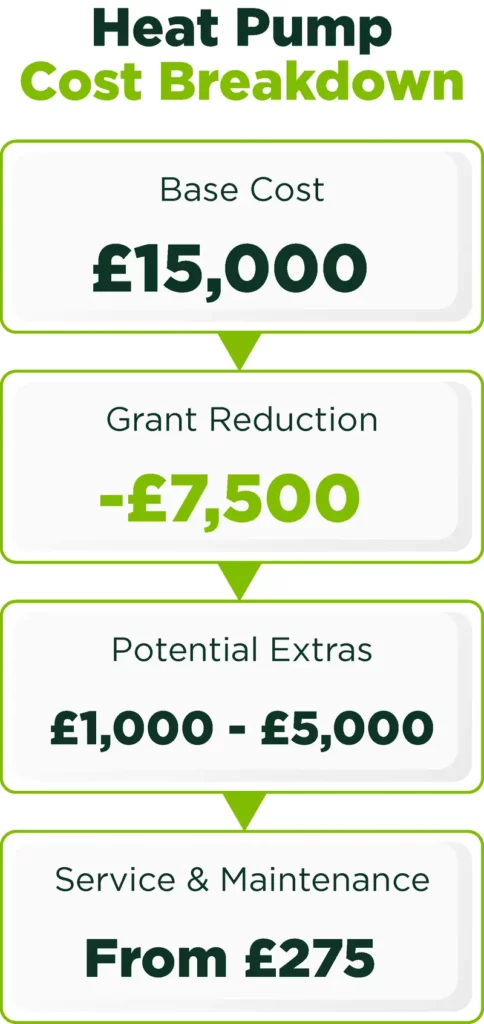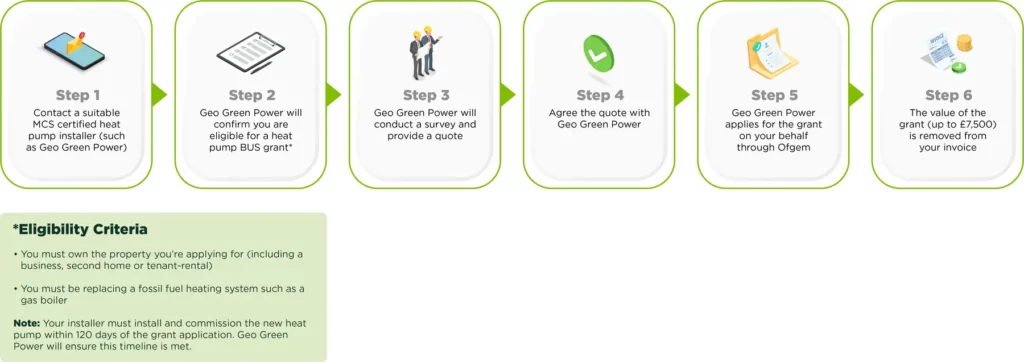If you’re considering replacing your gas or oil boiler with a renewable heating system, one of the first questions you’ll ask is: what does a heat pump cost in the UK in 2026? And beyond that, what’s the total cost of ownership, including installation, maintenance, and running costs?
With energy prices still volatile and the UK’s net-zero targets driving policy, heat pumps have become one of the most popular low-carbon heating options. They promise lower emissions and long-term savings, but understanding the real-world costs is essential for making an informed decision.
Why Heat Pumps Are Gaining Popularity
Heat pumps are central to the UK’s decarbonisation strategy. They extract heat from the air or ground and use electricity to amplify it, delivering efficient heating and hot water. Compared to gas boilers, they can cut carbon emissions by up to 65% and reduce reliance on fossil fuels. With the government aiming for 600,000 heat pump installations per year by 2028, demand is rising fast.
Key benefits include:
- Lower carbon footprint
- Long Lifespan (20-25 years)
- Potential savings on energy bills
- Integration with solar PV for near-zero heating costs
Premium Heat Pump Costs in 2026
Heat pump installation costs vary widely depending on property size, insulation, and system type. Here’s an updated cost guide for premium heat pumps based on our research, industry data and government figures:
| Property Size | Typical System Size | Estimated Cost Range* |
| 2–3 bedrooms | 5-12 kW | From £15,000 |
| 4–5 bedrooms | 12+ kW | From £17,000 |
| *Before grants or upgrades to radiators/pipework. | ||
According to official MCS data, the average air-source heat pump cost in late 2024 was £12,868, or about £5,368 after the £7,500 Boiler Upgrade Scheme grant. British Gas reports similar figures, with most households paying between £5,000 and £6,000 after grants. Ground-source heat pumps remain significantly more expensive, often £18,000–£25,000, due to excavation costs.
What does a heat pump cost with premium installation?
Premium heat pump costs typically start at £15,000 before the BUS grant is applied. This includes a high-end heat pump system, installed by heat pump specialists to the highest UK standards. This results in heat pumps lasting longer, running more efficiently, and lower service costs.

Government Incentives in 2026
The Boiler Upgrade Scheme (BUS) continues to offer £7,500 grants for air-source and ground-source heat pumps in England and Wales, with a budget of £295 million for 2025/26. This scheme runs until 2028, making heat pumps more accessible than ever.
Eligibility highlights:
- Property in England or Wales
- Owner-occupier or landlord
- Replacing a fossil-fuel system
- Valid EPC
- MCS certified installer
Other funding options include green finance loans and local authority schemes, which can further reduce upfront costs.

What Factors Affect Heat Pump Costs?
Several variables influence installation costs:
- Property size and insulation – Larger homes or poorly insulated properties need bigger systems.
- Heat pump type – Air-source is cheaper; ground-source offers higher efficiency but costs more.
- Existing heating system – Upgrading radiators or pipework adds to the bill.
- Hot-water demand – High usage may require a buffer tank.
- Installer expertise and brand choice – Accredited installers and premium brands ensure reliability and warranty coverage.
Additional considerations:
- Location: Rural areas may have higher installation costs.
- Energy tariffs: Switching to a heat pump-friendly tariff can improve savings.
Why Low Installation Costs Are a False Economy
Or to put it a different way – what does a heat pump cost when installed “cheaply”? Choosing the lowest quote may seem attractive, but poor design or installation often leads to inefficiency, frequent repairs, and early replacement.
After an annual service in 2024 revealed several issues, and ultimately Ms Kemsley’s heat pump system (which was poorly installed by another installer) failed. Despite multiple repair attempts, the system could not be restored reliably. Geo Green Power replaced it with a correctly sized, high-quality model – restoring comfort and efficiency.
This example shows that investing in expert design, trusted brands, and accredited installation avoids future expense and frustration.
Premium Heat Pump Installation
Not all heat pump installations are the same. With heat pump costs in the thousands, consumers need to know their system will be installed to the highest standard. Premium heat pump installation includes wall-through sleeving, copper fittings, and MLCP pipes as well as engineers who are trained in making new installations “service-ready” and ensuring communication with the customer is accurate, consistent, and frequent.
Premium heat pump installs are more expensive, but it ensures the system lasts for longer, runs to optimal efficiency and reduces the time and frequency of service call outs.
Top Heat Pump Brands and Models in the UK (2026)
Geo Green Power use Vaillant and Stiebel Eltron heat pumps for one reason. They are high quality, reliable heat pumps.
Vaillant have some of the highest efficiency ratings of any heat pumps with some achieving a 500% increase in efficiency over gas boilers. This makes them especially powerful when combined with solar PV.
Lesser-known Stiebel Eltron offer high levels of reliability. These heat pumps represent German engineering at its best.
Other leading heat pump brands include Mitsubishi, Viessmann, Daikin, Nibe, and Samsung.
| Brand | Model | Installed Cost Range | Key Benefits |
| Vaillant | aroTHERM Plus | £££ | Quiet, COP > 4, smart controls |
| Stiebel Eltron | WPL Classic | £££ | German engineering, excellent reliability, smart connectivity |
| Mitsubishi | Ecodan | ££ | Proven performance, wide UK installer network, advanced controls |
| Daikin | Altherma 3 | ££ | Compact, ideal for smaller homes |
| Nibe | F2040 | ££ | High performance in cold weather |
| Samsung | EHS HT Quiet | ££ | Ultra-low noise, COP up to 5 |
| Premium models often include smart connectivity, weather compensation, and integration with solar PV systems. | |||
How Much Electricity Does a Heat Pump Use?
Heat pumps are highly efficient, typically delivering 3–4kWh of heat per 1kWh of electricity (COP 3–4). For a typical UK home:
- Annual electricity use: 2,700–4,000kWh for heating and hot water.
- Running cost: £700–£1,200/year depending on tariffs.
Compared to gas boilers, heat pumps are three to four times more efficient. However, they use electricity which is currently around three times more expensive than gas. On first glance the cost savings compared to gas boilers are negligible. However, with the right combination of energy efficiency usage include a heat pump tariff and solar PV, there is scope for significant savings.
Combining Heat Pumps with Solar PV
Pairing heat pumps with solar PV can slash running costs:
- A 4kW solar system generates ~4,000 kWh/year, offsetting up to 60% of heat pump electricity use.
- Combined systems can save £1,250–£2,100 annually.
This integration also helps homeowners achieve near-net-zero heating and future-proof their energy systems.

Maintenance and Service Costs
Annual servicing is essential for efficiency and warranty compliance:
- Air-source heat pump service: £150–£500
- Ground-source heat pump service: £300–£750
Tasks include:
- Electrical safety checks
- Refrigerant level inspection
- Cleaning filters and coils
- Leak detection
Timely maintenance prevents breakdowns and ensures optimal performance.
What Does a Heat Pump Cost?
And is it worth it? Yes – especially with grants and expert installation. Benefits include a longer lifespan, lower carbon footprint and big potential savings
Case studies show that well-installed premium systems deliver consistent comfort and long-term savings. Poor installation, however, can lead to inefficiency and costly repairs – so choosing an accredited installer is critical.
Future Outlook
With ongoing government support and technological improvements, heat pumps are expected to become even more efficient and affordable. Innovations like hybrid systems and smart energy management will further enhance performance and savings.
Next Steps
Ready to make the switch? Contact us for a tailored quote and grant application support. Consider combining your heat pump with solar PV for maximum savings and sustainability.


